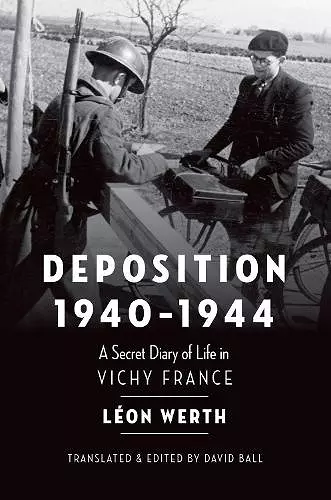Deposition 1940-1944
Format:Paperback
Publisher:Oxford University Press Inc
Published:13th Oct '21
Should be back in stock very soon
This paperback is available in another edition too:
- Hardback£35.99(9780190499549)

Historians agree: the diary of Léon Werth (1878-1955) is one of the most precious--and readable--pieces of testimony ever written about life in France under Nazi occupation and the Vichy regime. Werth was a free-spirited and unclassifiable writer. He is the author of eleven novels, art and dance criticism, acerbic political reporting, and memorable personal essays. He was Jewish, and left Paris in June 1940 to hide out in his wife's country house in Saint-Amour, a small village in the Jura Mountains. His short memoir 33 Days recounts his struggle to get there. Deposition tells of daily life in the village, on nearby farms and towns, and finally back in Paris, where he draws the portrait of a Resistance network in his apartment and writes an eyewitness report of the insurrection that freed the city in August, 1944. From Saint-Amour, we see both the Resistance in the countryside, derailing troop trains, punishing notorious collaborators--and growing repression: arrests, torture, deportation, and executions. Above all, we see how Vichy and the Occupation affect the lives of farmers and villagers and how their often contradictory attitudes evolve from 1940-1944. Werth's ear for dialogue and novelist's gift for creating characters animate the diary: in the markets and in town, we meet real French peasants and shopkeepers, railroad men and the patronne of the café at the station, schoolteachers and gendarmes. They come off the page alive, and the countryside and villages come alive with them. With biting irony, Werth records, almost daily, what Vichy-German propaganda was saying on the radio and in the press. We follow the progress of the war as people did then, day by day. These entries make interesting, often amusing reading, a stark contrast with his gripping entries on the persecution and deportation of the Jews. Deposition is a varied and complex piece of living history, and a pleasure to read.
David Ball's thoughtful and nuanced translation presents this work to an Anglophone readership for the first time and his introduction is punchy and precise ... On both the very colourful local level and on a grander national level, Werth's diary — and this timely translation by David Ball — are vital reading for anyone interested in this dark period of French history. * David Lees, Journal of Modern Jewish Studies *
There is much to be admired in Werth's Deposition. While the immediate context and description of a rural village at war is valuable in and of itself, Werth's musings on politics, the press, and human nature add a dimension that makes this more than a chronicle of shortages and daily life in a small town. Werth is both an observer and a participant in the history unfurling before him. He captures the ambiguity, ambivalence, and endless waiting associated with the war as it was happening. With the advantage of hindsight, scholars have written about the topics that Werth experienced and recorded in real time with the extraordinary talent of an ethnographer....David Ball's highly readable translation of this remarkable record is a welcome addition for scholars of the Vichy period and suitable for classroom use. * Shannon L. Fogg, H-France Review *
ISBN: 9780197602966
Dimensions: 160mm x 236mm x 25mm
Weight: 567g
368 pages